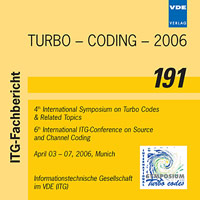Source-Channel Tradeoffs in Iterative Joint Source-Channel Decoding of Sources with Memory
Conference: TURBO - CODING - 2006 - 4th International Symposium on Turbo Codes & Related Topics; 6th International ITG-Conference on Source and Channel Coding
04/03/2006 - 04/07/2006 at Munich, Germany
Proceedings: TURBO - CODING - 2006
Pages: 6Language: englishTyp: PDF
Personal VDE Members are entitled to a 10% discount on this title
Authors:
Weidmann, Claudio (Telecommunications Research Center Vienna (ftw.), 1220 Vienna, Austria)
Siohan, Pierre (France Telecom R&D Division, 35512 Cesson Sévigné Cedex, France)
Abstract:
Iterative joint source-channel decoding (ISCD) allows to exploit residual source redundancy for error correction. Residual redundancy results from a mismatch between the source statistics and the source code, and may be accidental or designed. This paper considers sources with memory encoded with a variable-length code (VLC) designed for a marginal statistic. In particular, a well-known soft-in-soft-out (SISO) VLC decoder is extended to differentially encoded sources and evaluated for different levels of source correlation. There exist operating conditions under which it is better to leave the redundancy in the source code, rather than remove it by differential encoding. This shows that the source and channel encoder designs should be carefully chosen in order to obtain the best graceful degradation performance that ISCD can offer.


